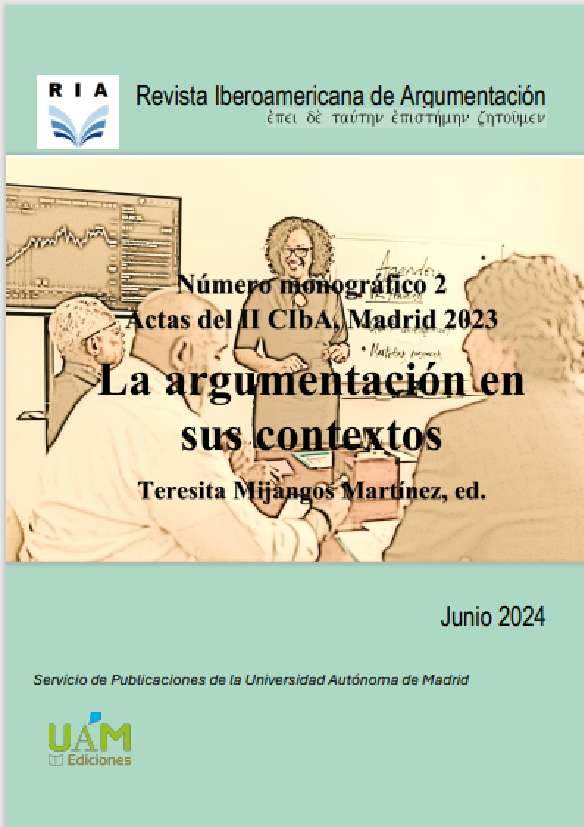Keywords:
argumentation, aesthetic, emotions, logic, sensible knowledgeCopyright (c) 2024 Revista Iberoamericana de Argumentación

This work is licensed under a Creative Commons Attribution-NonCommercial-NoDerivatives 4.0 International License.
Abstract
Emotions are complex systems that combine thoughts, culture, feelings, and contexts and do not follow traditional logical patterns, making their comprehension challenging. Some theories, such as those of Solomon (2003) and Ben Ze'ev (2004), suggest that emotions can approach rationality at certain moments. However, emotions cannot be explained rationally in some situations, as not all are cognitions. Emotions possess a different, sensible logic that does not align with traditional rationality. This work argues that emotions are reasonable, alogical, complex, and sensible, forming a coherent yet non-rational reasoning system. Emotions can be understood from an aesthetic perspective, a framework of sensible knowledge. I propose observing the sensible from this framework of understanding, where they can be evaluated and comprehended in argumentation as forms of the sensible.
Downloads
References
Ben-Ze'ev, A. (2000). The subtlety of emotions. MIT Press.
Ben-Ze'ev, A. (2004). Emotions are not mere judgments. Philosophy and Phenomenological Research, 68(2), 450.
Bitzer, L. F. (1992). The rhetorical situation. Philosophy & Rhetoric, 25(1), 1-14. Penn State University Press. https://www.jstor.org/stable/40237697
Cassirer, E. (1971). Filosofía de las formas simbólicas, I: El lenguaje. Fondo de Cultura Económica.
Damasio, A. R. (1994). Descartes' error: Emotion, reason, and the human brain. Putnam.
De Sousa, R. (1987). The rationality of emotion. MIT Press.
Eco, U. (1980). El nombre de la rosa. Milán: Bompiani.
Fernández Christlieb, P. (1994). La psicología colectiva: Un fin de siglo más tarde. México: Universidad Nacional Autónoma de México.
Fernández Christlieb, P. (2000). La afectividad colectiva. México: Taurus.
Fernández Christlieb, P. (2023). Psicología estética de la situación social. Ciudad de México: Facultad de Psicología.
Fernández, P. (2007). Lo que se siente pensar o la cultura como psicología. México: Taurus.
Fortenbaugh, W. W. (1975). Aristotle on emotion. Barnes & Noble.
Gilbert, M. (1997). Coalescent argumentation. University of Chicago Press.
Groarke, L. (2015). Going multimodal: What is a model of arguing and why does it matter? Argumentation, 29(2), 133-155.
Heller, A. (1979). Teoría de los sentimientos. Barcelona: Fontamara. (Trad.: Francisco Cusó, 1980).
Johnson-Laird, P. N., Khemlani, S. S., y Goodwin, G. P. (2015). Logic, probability, and human reasoning. Cognitive Science, 39(5), 867-875.
Kant, I. (1974). Observaciones sobre el sentimiento de lo bello y lo sublime. México: Fondo de Cultura Económica.
Langer, S. (1953). Feeling and form. New York: Charles Scribner’s Sons.
Morrisroe, P. (2020). The woman in the moonlight. Little A.
Solomon, M. (1998). Beethoven. Schirmer Books.
Solomon, R. C. (2003). Not passion's slave: Emotions and choice. Oxford University Press.
Thayer, A. W. (1866). Life of Beethoven.
Tindale, C. (2021). The anthropology of argument. New York: Routledge.
Tovey, D. F. (1931). A companion to Beethoven's pianoforte sonatas. London: Associated Board of the Royal Schools of Music.
